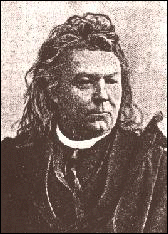
Fr. Abram Joseph Ryan

Fr. Abram Joseph Ryan |
|
Abram Joseph Ryan was born February 5, 1838, in Hagerstown, Maryland, the son of Irish immigrant parents. (Some sources claim he was actually born more than a year later, on August 15, 1839, in Norfolk, Virginia, but the 1838 date and the Maryland location seem to be more universally accepted. The existence of a Fr. Ryan house in Norfolk indicates that at least part of his early childhood may have been spent in that city.) Young Ryan soon migrated west with his family to St. Louis, Missouri, where he was educated at the Christian Brothers School. He studied for the priesthood at Niagra University in New York State and was ordained a priest in the Vincentian order on November 1, 1856. He taught theology first at the university and then at the diocesan seminary in Cape Girardeau, Missouri, until the beginning of the War Between the States.
A Southerner to the core in spite of his Irish heritage and mostly Northern upbringing, Fr. Ryan enlisted in the Confederate Army on September 1, 1862, and served as a chaplain throughout the conflict, carrying the wounded to safety and performing last rites on the battlefield. His first piece of poetry was inspired by the death of a younger brother in action, and he quickly became known as the "Poet-Priest of the Confederacy."
After the War, Fr. Ryan moved from parish to parish throughout the South. After stays in Biloxi, Mississippi; Nashville, Knoxville, and Clarksville, Tennessee; and Macon and Augusta, Georgia, he finally settled at St. Mary's parish in Mobile, Alabama. There he established a weekly literary magazine known as "The Banner of the South," in which most of his poetry was published. He also put out several volumes of verse, including Father Ryan's Poems and A Crown for Our Queen. During a yellow fever epidemic that swept through the city, Ryan ministered tirelessly to the ill and dying, further cementing his place in the people's affections.
Fr. Ryan died April 22, 1886, at a Franciscan monastery in Louisville, Kentucky, but was returned to his spiritual home at St. Mary's in Mobile for burial. To the end of his life, he offered no apologies for the South and refused to concede anything to the victorious Union. In recognition of his loyal service to the Confederacy, a stained glass window was placed in the Confederate Memorial Hall in New Orleans, Lousiana, in his memory. His most famous poem is "The Conquered Banner."
This page is http://civilwarpoetry.org/authors/ryan.htm
Last modified 16-April-2001